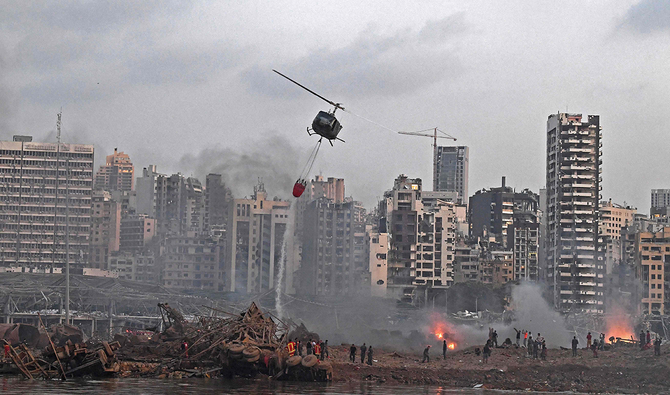JEDDAH: There has been a global outpouring of sympathy and support for the people of Lebanon since the devastating explosion in Beirut on Tuesday that left dozens dead and thousands injured. In Saudi Arabia, the shock and sense of loss has been particularly great, given the historic ties between the countries and the community of Lebanese expats in the Kingdom.
The Saudi Ministry of Foreign Affairs was quick to pledge the country’s full support for and solidarity with the “brotherly Lebanese people.”
As horrific videos of the massive explosion in Beirut’s port area continue to be broadcast on TV news channels and shared widely on social media, along with scenes of the massive rescue and recovery operation in the Lebanese capital, many people in Saudi Arabia have been desperately trying to contact friends and family in the “Paris of the Middle East” to check they are safe.
The explosion is the latest devastating catastrophe to hit the people of Lebanon, following a prolonged economic crisis that has provoked sustained street protests against political corruption and mismanagement, and the ongoing challenges created by the coronavirus pandemic.
“I don’t have a homeland anymore,” said Ali Chaaban, a Lebanese artist who has lived in Jeddah for six years. “My identity is crashing and deteriorating bit by bit. My city is gone and so is my identity.”
He said that it is hard to comprehend the scale of the devastation caused by the blast and added: “Beirut is now declared a ‘disaster city,’ and I can no longer go back any time soon.
“My emotions are mixed and it’s hard to blame someone at this time but my country has been disappearing bit by bit and this is all internal. This is a result of internal conflict and we’re tired of crying out. There’s nothing left.”
Chaaban has a background in anthropology and said his work, which is highly expressive, revolves around the struggle of identity among the masses. The despair he felt after the explosion prompted him to post a simple yet moving image featuring the official logo of the city, with the red smoke from the blast superimposed on the simple brushstrokes of the Arabic text, which is surrounded by black as the city mourns. His work is a lament for his city, where once beautiful streets are now littered with glass and rubble.

“Our identity is based on endurance,” he said. The Lebanese people have suffered years of civil war, aggression from Israel, a corrupt government and more, he said, which raises the question “what next? How much longer can we endure and what’s the point?”
For years, Lebanon has been a popular tourist destination for visitors from the Gulf, many of them from the Kingdom. For many Saudis, who take summer and winter vacations in its beautiful cities and scenic mountains and have bought properties there, it is a home away from home. More than 20,000 visited the country in the first half of 2019 alone.
Saudi artist Taghreed Wazna said she frequently visits Beirut and has never felt more at home than when she is there. For the past few years, she said, she has extended her trips as she always feels safe and loved by friends that she describes as being more like family.
“I was shocked beyond words (about the explosion),” she said. “I stayed in Beirut for so long that I feel like I know it like the back of my hand. Every time I find a picture of a street I recognize or a cafe, I point and think, ‘I was just there. I had coffee here, lunch there.’ My heart breaks for the city.
“I was in Beirut during the last riots and saw the devastation that caused, but never could I have imagined it could get worse.
“I called every single one of my friends and though their homes are shattered, they’re all safe. But my heart is broken for my loved ones — how will people live and buy their daily needs?”
Nevertheless, Wazna is determined to return to her beloved city as soon as the Kingdom lifts the international travel ban imposed to prevent the spread of the coronavirus. “Beirut will rebuild, one way or another,” she added.
Messages of condolences poured in from across the Kingdom, many of them posted on social media.
Salem Aqeel from Jeddah said: “I offer my heartfelt condolences and prayers to the Lebanese people. I am very touched and saddened by what happened. It is horrifying. I hope Lebanon never experiences such a thing again. It’s a beautiful country and does not deserve what is happening.”
Saudi leadership coach and entrepreneur Rozana Al-Banawi said: “If you woke today feeling heartbroken, shattered, in pain, let it out. Cry. We should all be crying with Beirut. I am now. I was last night. Cry. You are a human.”
Marwa Al-Jawad, a Lebanese model who lives and works in Saudi Arabia said: “As a Lebanese citizen, my heart aches for those who experienced this incident. All the Lebanese people all over the world received the incident in the same way.
“I believe that what happened yesterday makes us more bonded together. Yesterday we all cried, we all thought it’s a nightmare, we all shared the same feelings for our beloved Lebanon, and soon we will all heal and get the victory we all wish for.”
Al-Jawad believes that the feelings of sadness and anger should motivate the people of Lebanon to make a renewed push for change in the country.
“Yesterday should never be forgotten, it should be the power and the push we need to get our country back from the ones destroying it,” she said. “I ask for every Lebanese citizen in the country to never give up and never forget that Lebanon is ours and we will get it back as before and even better than what it was. I believe in them and I believe in Lebanon.”
















